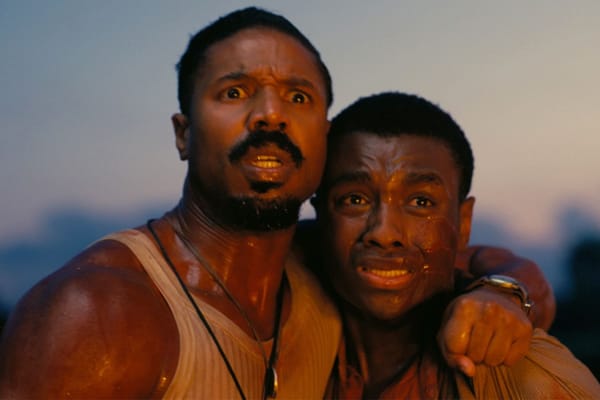Hell of a week

It's Friday – the last day of my one-week stretch of unemployment. Did I spend it well? Hm, let's see. I did a lot of weeding (to paraphrase Dumbledore, it's important to weed and keep weeding, for only then could dandelions be kept at bay, though never quite eradicated), and I got to attend a 9:10 a.m. showing of Sinners, which I'm happy to report lived up to the hype; I'm even more excited to report that it has a key plot point that turns on a particularly cruel feature of the sharecropping economy – a detail that I'd venture to guess most viewers will be learning about for the first time.
And I did manage to fire off two blog posts – unclear if that's a tick in the column of having spent the week well or having spent it poorly.
The first post was a look at the president's bizarre claim that 1913 was the bookend to some Golden Age in American civic life. Absolute madness!

The second, a response to Bluesky post about why there hasn't been more art about Trump.

Immediately after posting this one, I thought of approximately 50 other things I wish I'd included, from Wicked to RoboCop to this skeet about Jurassic Park:
Watching Jurassic Park, where a computer nerd with a debt problem and delusions of grandeur tears down all the safety systems, with no understanding of the consequences, so he can better facilitate his planned espionage and theft.
— Vicky Harp (@vickyharp.com) 2025-03-15T03:21:42.149Z
Here are some things made by people other people that I enjoyed this week:
A Good Sci-Fi Short Story
Arthur C. Clarke's "Exile of the Eons" reads like a sf version of the "Appointment in Samarra." The whole thing is excellent, but the second paragraph in particular is an absolute banger:
"In a few hours at the most, the Master and his dreams of empire would have vanished into the past. Nations would still curse his name, but they would no longer fear it. Later, even the hatred would be gone and he would mean no more to the world than Hitler or Napoleon or Genghis Khan. Like them he would be a blurred figure far down the infinite corridor of time, dwindling towards oblivion."
A Few Good Links
There's much to recommend in Derek Guy's comprehensive "The Evolution of the Alpha Male Aesthetic," which picks up its timeline in the late 1800s and runs through to the present day. But a passage on Arnold Schwarzenegger and Sylvester Stallone stood out as being particularly relevant to our interests:
In the early 1970s, Ken Sprague purchased Gold’s Gym, a struggling fitness club just blocks from the Pen. Sprague believed it needed to be more than a training space—it had to be a theater. He organized competitions, invited photographers and let director George Butler use Gold’s as the set for his 1977 documentary, Pumping Iron. The film, which followed rising stars such as Arnold Schwarzenegger, became a surprise hit and helped legitimize a culture often written off as self-obsessed spectacle. Its success lured magazines and TV shows to latch on to the commercial fitness boom. By decade’s end, Gold’s Gym T-shirts—printed with a cartoon strongman inspired by Mr. Clean—were stretched across hulking torsos nationwide.
In the years that followed, Hollywood turned bodybuilders into icons. Schwarzenegger and Sylvester Stallone dominated the box office with action hits such as Conan the Barbarian and the Rocky and Rambo series. They were cast as warriors and street fighters, and their physiques stood for grit, dominance and—at times—moral clarity. Their silhouettes became templates, reproduced in pop culture ephemera.
Like many people, I was captivated by Semafor's reporting on how Silicon Valley got radicalized in group chats. It's left me thinking which of these characters I am in my own group chats, and I'm worried that the honest answer is Marc Andreesen.
A particularly instructive passage covers a period in the summer of 2021, when a group of red states passed laws making it illegal for public schools to teach students that slavery and sexism have been forces that have profoundly shaped our nation's history. Some members of the chat wrote a New York Times op-ed criticizing these laws, and an argument broke out.
The conservatives had thought the Harper’s letter writers were their allies in an all-out ideological battle, and considered their position a betrayal. Andreessen “went really ballistic in a quite personal way at Thomas,” a participant recalled. The group ended after Andreessen “wrote something along the lines of ‘thank you everybody, I think it’s time to take a Signal break,’” another said.
The meltdown of this liberal-tech alliance was, to Rufo, a healthy development.
“A lot of these technologists hoped that the centrist path was a viable one, because it would permit them in theory to change the culture without having to expose themselves to the risk of becoming partisans,” he said. “By 2021, the smartest people in tech understood that these people were a dead end — so the group chats exploded and reformulated on more explicitly political lines.”
Rufo had been there all along: “I looked at these chats as a good investment of my time to radicalize tech elites who I thought were the most likely and high-impact new coalition partners for the right.”
Albert Burneko on the absurd New York Times article about whether ChatGPT deserves human rights:
There may someday be conversations to have and questions to examine about the possible rights of, and ethics of dealing with, theoretical sentient and conscious manmade artificial beings ... But the effort to spark those conversations about today's large language and generative text models is marketing. That is why it is being driven and publicized by the very companies building and selling those products.
It is so clearly and obviously not anything else but marketing that the awareness that I am typing this sentence right now instead of doing anything else makes me want to drop a grand piano on my own head. I would not feel any less insane if I were explaining to an extravagantly paid professional journalist that Spongebob Squarepants is not a real person, or that the guy in the Female Body Inspector T-shirt on the boardwalk is not actually an official female body inspector, or that Mommy goes right on existing even when she leaves the room.
A Few Good Posts
If you expose someone’s hypocrisy, they instantly take 2d6 psychic damage and must discard one item from their inventory at random
— ceej (@ceej.online) 2025-04-30T00:02:42.651Z
everything bad about the internet, tv, and every single generation is all on extremely stark display right now. only a race of angelic elder millennials who don't watch videos can get us back on track
— Patrick Cosmos (@veryimportant.lawyer) 2025-04-29T17:44:38.602Z
Love this. Great use of executive order. All dentists must be 5’9”. All baristas have to read “The Dead Zone.” You can’t get a fishing license if your name is Gregg.
— Ken Tremendous (@kentremendous.bsky.social) 2025-04-29T17:46:22.423Z








